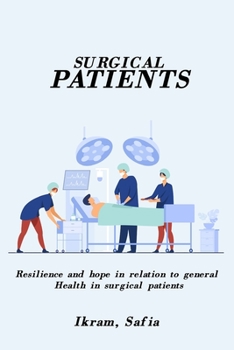Resilience And Hope In Relation To General Health In Surgical Patients
INTRODUCTION 1.1 Background of the Study The remarkable magnitude of human migration and mobility makes individuals vulnerable against uncommon and outlandish infections from the most remote corners of the world. And physical ailments can incline a person to mental sickness to some degree. Numerous chronic diseases are related to abnormal levels of hormones that can trigger the mental health of a person. And increased levels of stress can affect a person's physical as well as mental health. The frequencies of cancer, cardiovascular disease, and traumatic injuries are increasing day by day and giving rise to public health care. There can be circumstances where drugs, physical therapy, and way of life do not change or fix the problem or condition and the level of pain. Surgery is required at this stage. Surgical care has been a fundamental part of medical services worldwide for over a century. While surgical procedures are intended to save lives, substantial harm can be caused due to unsafe surgical care. Surgery affects overall health, concerns about the impact on the quality of life or lifespan of a person. A wide variety of expectations both positive and negative can be found before and after the surgery. Positive expectation is associated mostly with the good surgical outcome and negative expectation is mostly associated with the painful procedure and negative surgical outcome. Factors like hope and resilience enable one to develop mechanisms for protection against experiences which could be devastating. Such traits help to maintain balance in life during stressful and difficult situations. Also, it protects against the development of some mental health issues. Hope is keeping a positive attitude towards life, never giving up and living every day without limit. Hope is that one thing that pushes you in the difficult times. It is the perspective that accepts and wants a positive result in circumstances throughout one's life. Such positive factors play a vital role in healthcare management. Health psychologists promote healthy behaviors and deal with underlying psychological issues such as stress, depression and, anxiety. The interaction of depression, surgery and anesthesia may result in a significant increase in the mortality rate of patients. So acute prediction of preoperative risk enables informed consent for patients as well as can provide a guideline in clinical decision making,





